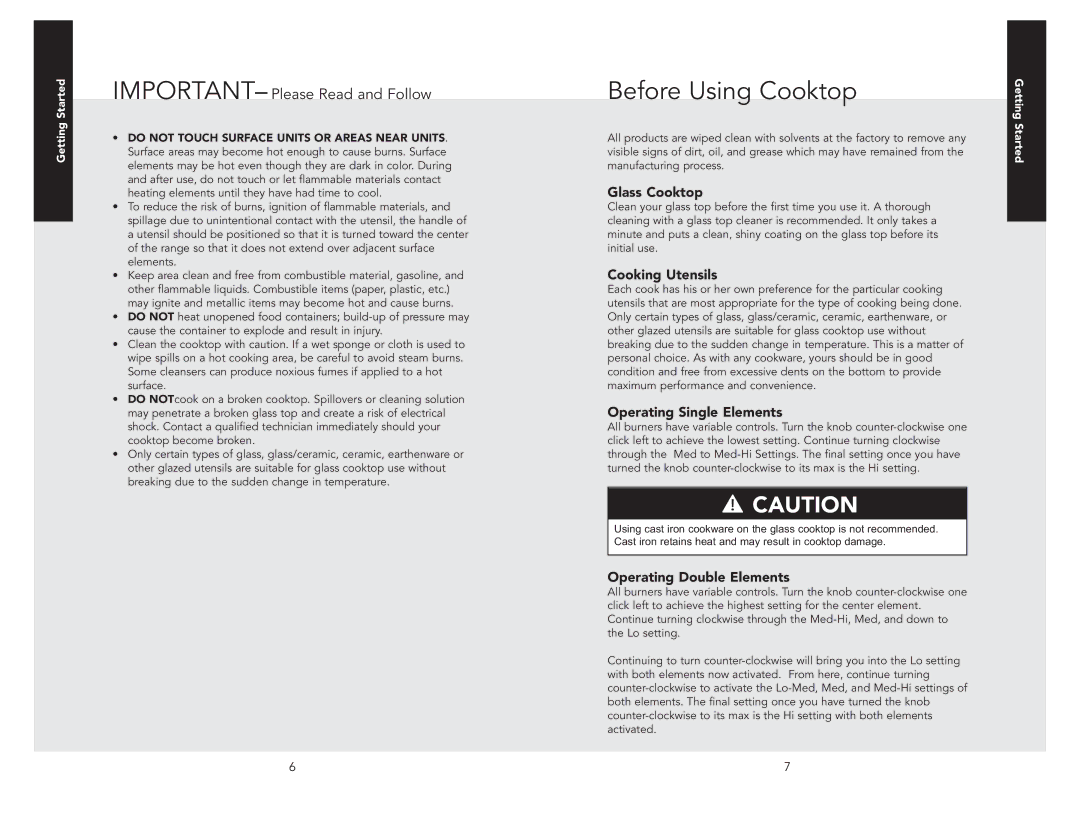
Getting Started
IMPORTANT– Please Read and Follow
•DO NOT TOUCH SURFACE UNITS OR AREAS NEAR UNITS. Surface areas may become hot enough to cause burns. Surface elements may be hot even though they are dark in color. During and after use, do not touch or let flammable materials contact heating elements until they have had time to cool.
•To reduce the risk of burns, ignition of flammable materials, and spillage due to unintentional contact with the utensil, the handle of a utensil should be positioned so that it is turned toward the center of the range so that it does not extend over adjacent surface elements.
•Keep area clean and free from combustible material, gasoline, and other flammable liquids. Combustible items (paper, plastic, etc.) may ignite and metallic items may become hot and cause burns.
•DO NOT heat unopened food containers;
•Clean the cooktop with caution. If a wet sponge or cloth is used to wipe spills on a hot cooking area, be careful to avoid steam burns. Some cleansers can produce noxious fumes if applied to a hot surface.
•DO NOTcook on a broken cooktop. Spillovers or cleaning solution may penetrate a broken glass top and create a risk of electrical shock. Contact a qualified technician immediately should your cooktop become broken.
•Only certain types of glass, glass/ceramic, ceramic, earthenware or other glazed utensils are suitable for glass cooktop use without breaking due to the sudden change in temperature.
Before Using Cooktop
All products are wiped clean with solvents at the factory to remove any visible signs of dirt, oil, and grease which may have remained from the manufacturing process.
Glass Cooktop
Clean your glass top before the first time you use it. A thorough cleaning with a glass top cleaner is recommended. It only takes a minute and puts a clean, shiny coating on the glass top before its initial use.
Cooking Utensils
Each cook has his or her own preference for the particular cooking utensils that are most appropriate for the type of cooking being done. Only certain types of glass, glass/ceramic, ceramic, earthenware, or other glazed utensils are suitable for glass cooktop use without breaking due to the sudden change in temperature. This is a matter of personal choice. As with any cookware, yours should be in good condition and free from excessive dents on the bottom to provide maximum performance and convenience.
Operating Single Elements
All burners have variable controls. Turn the knob
![]() CAUTION
CAUTION
Using cast iron cookware on the glass cooktop is not recommended. Cast iron retains heat and may result in cooktop damage.
Operating Double Elements
All burners have variable controls. Turn the knob
Continuing to turn
Getting Started
6 | 7 |
